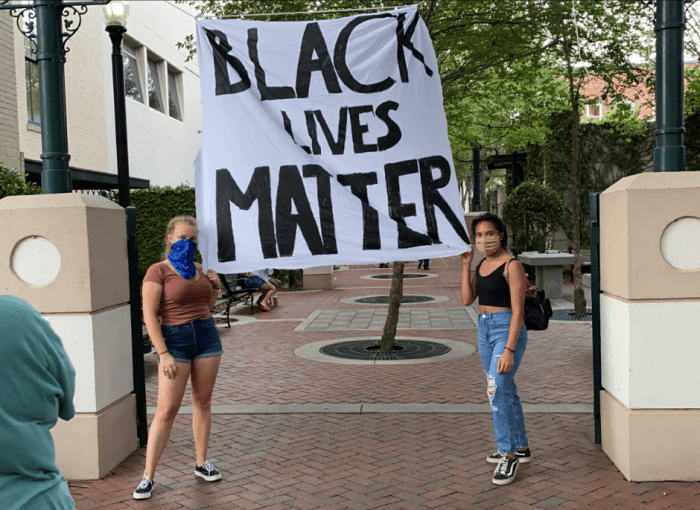By Kealani Smith
I hated being Black.
At twelve, it was the part of me that felt like a stain on my identity. I begged my mom to straighten my hair. I saved babysitting money for months to pay for perms in an attempt to filter the Blackness out of me. I remember never putting on lotion after swimming in my grandma’s pool, so that the ashy color that layered on my dry skin would cast a pseudo paleness upon me. In this way, I could almost make believe I was the Whiteness I sought to embody. Social activist Nellie Wong writes these thoughts in her poem “When I was Growing Up”:
“ …I felt
dirty, I thought that god
made white people clean
and no matter how much I bathed,
I could not change, I could not shed
my skin in the grey water”
My family used to joke, “Lani wants to be White.” I used to bargain with God in hopes of one day magically waking up, gifted with my mom’s much lighter Filipino skin. Instead, the one drop of Black colors my experience.
The rhetoric of anti-Blackness is sold to Black people, while the borrowing of the Black identity (e.g., braids, curls, big lips) is praised in others. This notion of anti-Blackness in the Black experience is observed in an article published by The Guardian. In a piece on Blackfishing, writer Priya Elan writes, “Be it fashion, beauty or music, Black is cool, unless you’re actually Black.”
Throughout my life, I have always been told to straighten my hair because it is “unprofessional” to keep it natural or, the most redundant of comments, “that’s why you’re pretty, it’s because you’re mixed,” as if deserting a little bit of my Blackness is worthy of praise. These messages place me on the scale which measures my proximity to Whiteness so that I could identify myself on ranking of more or less Black. For as long as I can remember, my identity was shaped around abandoning Blackness so that I was not a “diversity pick,” the Black friend, or ghetto by conception.
I can vividly remember one specific conversation on race I had with my dad when I was twelve. I sat in the heated passenger seat of our family car that reeked of burnt leather; he was driving our usual route to my middle school in Northridge, California. In the silence of the drive, he looked at me and apologized. I felt confused as the silence grew sticky.
“Lani, I’m sorry that I made you Black…”
With tears blockading the space between his throat and his eyes, he continued,
“I know you don’t like being Black and I feel guilty that I made you that way.”
Now, at twenty-one, that morning holds substantial weight in my memory. Reflecting, I realize that my dad apologized for my conception and the inheritance of something that neither he nor I can control. Blackness, to him, was worthy of apology.
It has become clear with the Black Lives Matter movement today that Blackness is a topic ofradicaland necessary discussion. Upon hearing the news of George Floyd, it felt like my sister and I could not stop crying. We were watching this happen again, another Black person murdered again. As we cried in our bedrooms, we cried for our dad who is, unmistakably, a Black man. We cried as if we heard our dad’s voice laced into Floyd’s as he whimpered for his mother. We cried for our future Black children, as our fear and grief will one day be theirs to claim. It was as if we finally woke up to the fact that Blackness is the only crime that can be inherited through generational misfortune.

With all the emotions we felt, we, like many others, put on our masks to head out and protest. Unknowingly, this decision brought more peace than I expected. Suddenly we were surrounded by other Black people who grieved like we did. I felt that the Black experience was stepping out of the shadows of shame and into the light as people of all races cried together in the streets. I felt optimistic that the victims of police brutality would not be phased out of history with a hashtag as the community in front of me demanded action.
Even with the craziness of COVID-19 and the social distancing measures, people of Volusia County rallied throughout DeLand. We got on our knees in front of the local courthouse, placed our hands in the air and shouted, “hands up, don’t shoot.” The community’s collective call for justice brought forth an intense sense of togetherness regardless of social distancing precautions.
This is a small sample of what it has felt like as a mixed-Black woman during this cultural movement. I had rejected Blackness for so long that I had internalized the racist beliefs that taught me to hate Blackness and, therefore, hate a part of me. At twenty-one, I am unapologetically Black. I wear my curls with pride, and I embrace the beauty in my skin that represents my culture and heritage. Not only this, but I am proud to advocate for the freedom and validation of my community.
My recent experiences protesting have stimulated conversation in my own life. It has opened the pathway for questioning: what is racism and how can we work to be actively anti-racist?
Above all, anti-racism is not neutrality. Anti-racism is not silence.
It is not enough to say, “I may not understand, but I stand with you” or “I don’t see color.” We need to seek out the education that schools have not provided for us. Acknowledging that there is a colored experience is the first step in working to be anti-racist. Ultimately, to not see color is to erase a part of identity. Watch documentaries by Black filmmakers, read books on the colored experience and the prevalence of colorism. Remember that it is not the responsibility of Black people to educate others but a personal initiative one must take on themselves.

Work to always be self-examining the internal beliefs of others because, whether Black or non-Black, the title of anti-racist is a temporary label, one that is dependent on what someone chooses to do with their energy. It is not enough to “stand” with somebody; words do not do enough. Ultimately, actions (signing petitions, protesting, donating, self-educating, voting) are what will earn the label of anti-racist. Even after doing so, always be prepared to practice self-awareness of the beliefs unconsciously held regarding identity.
Lastly, make the effort to confront the conversation on race. If Black friends or Black family feel comfortable enough to share their experiences, then respectfully listen. Do not negate nor undermine the emotional weight they carry with their skin. These conversations might feel like an invitation for intellectual debate, but for a Black person, topics like racism and colorism are very much realities, not debates.
Admittedly, this is a weird time. Somehow this generation has entered a global pandemic and a cultural revolution simultaneously. Regardless, it is important to remember that we, as UCF students, are responsible for creating an inclusive environment that shows respect to the cultures and experiences of others. No one should have to apologize for who they naturally are.




